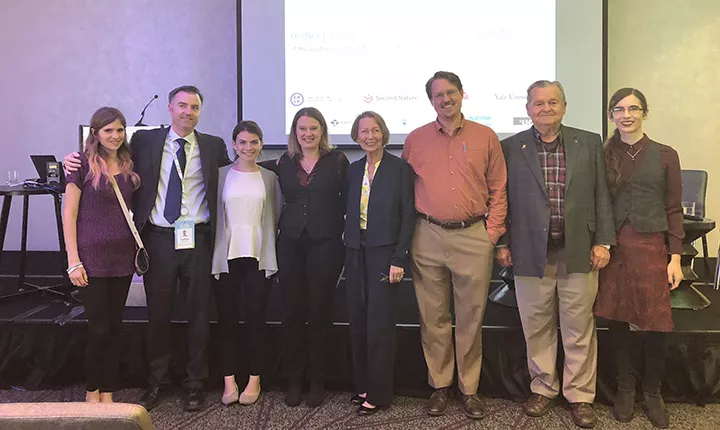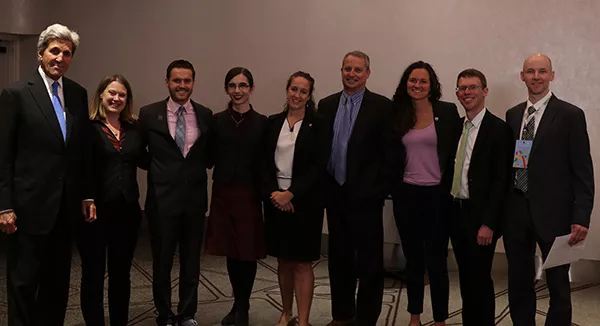Swarthmore's Carbon Pricing Efforts Lauded at Global Climate Action Summit

Attending the Global Climate Action Summit: Brittni Teresi ’19; Matthew St. Clair ’97, director of sustainability at the University of California; Samantha Goins ’19; Aurora Winslade, director of sustainability; Carol Buchser '67; David Eldridge ’90, associate director of individual giving; Bob Buchser; Nathaniel Graf ’16, climate action senior fellow.
Swarthmore was well represented at the Global Climate Action Summit in San Francisco last week, as members of the College's Office of Sustainability showcased the school's carbon pricing efforts as a key action in climate change solutions – and even earned a shout out from a former Secretary of State.
Several students also attended the conference, which highlighted climate action achievements by communities and organizations, including Swarthmore, and offered a platform for introducing new, ambitious climate commitments.
For students, it was an opportunity to engage with community groups and stakeholders from around the world in finding solutions to climate change. Nancy Yuan ’20, a political science major from Auckland, New Zealand, and Samantha Goins ’19, an environmental policy special major from Bethlehem, Pa., received support from the Office of Sustainability to attend events on topics such as urban forestry, led by the City of San Francisco, and the pricing of future climate damages, led by the Institute for Policy Integrity at New York University School of Law.
“Getting the opportunity to go to something like the Global Climate Action Summit is huge for me,” says Goins. “The many chances that Swat has afforded me to travel and learn and meet people who have jobs I only dreamed existed have been literally life-changing.”
For Director of Sustainability Aurora Winslade and Climate Action Senior Fellow Nathaniel Graf ’16, attending the summit meant a chance to present Swarthmore’s carbon pricing efforts. In partnership with Yale University, Second Nature, and the Carbon Pricing Leadership Coalition, they co-hosted Higher Education Leadership on Carbon Pricing, an affiliate event of the summit. It highlighted why higher education institutions should adopt an internal carbon tax and featured the release of a Higher Education Carbon Pricing toolkit, which Swarthmore helped develop. The toolkit includes an implementation guide and uses the College as a case study for how to adopt an internal carbon charge.
Former Secretary of State John Kerry opened the event, endorsing his support for higher education leaders who have adopted their own internal carbon charge.
“That’s why I’m so proud of what Yale and Swarthmore and Smith … are doing,” Kerry said, “because you are teaching, you are doing, you are making things happen.”

Former Secretary of State John Kerry (far left) praised higher education institutions like Swarthmore that had adopted an internal carbon charge.
After Kerry energized the audience, two panels explored themes addressed in the carbon pricing toolkit. One showcased the challenges and solutions of carbon pricing implementation, while the other explored higher education’s responsibility in carbon pricing and climate policy.
Winslade spoke in the first panel, highlighting Swarthmore’s solutions for implementing a carbon tax on campus. She emphasized how internal carbon pricing is a critical step that higher education institutions can take to help mitigate climate change.
“Over 50 national and sub-national governments and over 1,300 businesses have implemented a price on carbon," Winslade said. "Higher education has a critical role to as thought leaders in society to help advance this conversation.”
Since committing to the implementation of an internal carbon charge in 2016, Swarthmore has committed to building momentum for carbon pricing on a state, national, and global scale. By co-hosting Higher Education Leadership on Carbon Pricing and launching the carbon pricing toolkit at the summit, it furthered this goal.
“The carbon pricing event that Swarthmore co-hosted was a powerful testimony to the importance of pricing carbon as one of the most powerful tools available to the world to keep fossil fuels in the ground,” Winslade said.
Winslade also explained why Swarthmore took leadership at the summit in advocating for other higher education institutions to adopt an internal carbon charge.
“President Valerie Smith and the Board of Managers for the College, along with faculty, staff, and students, have taken a stance that we must call on our elected officials in the United States to price carbon,” she said.
Moving forward, the Office of Sustainability is excited to build off the carbon pricing toolkit and continue to encourage even more higher education institutions to adopt a carbon charge.
“We’ll continue to host workshops, provide resources, and speak with other schools,” Graf said. “We’re excited to expand and improve the toolkit to make it as useful as possible for other schools developing their own carbon internal pricing programs.”



